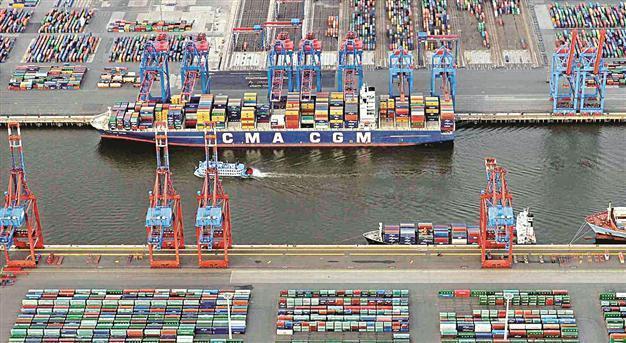German economy ‘may see economic slowdown’
FRANKFURT - Agence France-Presse

A container ship being loaded at a terminal in the harbor of Hamburg. REUTERS photo
The German economy, Europe’s biggest, will not be able to escape the crisis and may even see a technical recession early next year, but is well placed to rebound strongly, the Bundesbank said on Dec. 11.The German central bank, in its latest updated twice-yearly forecasts, said there were “indications that economic activity may actually fall in the final quarter of 2012 and the first quarter of 2013.” Recession is technically defined as two consecutive quarters of negative growth and many of Germany’s eurozone neighbors have been pushed into recession, in some cases deep, by the region’s long-running debt crisis.
Although Germany has managed to hold up to the crisis fairly well, growth has been slowing here as well since the beginning of the year.
After expanding by 0.5 percent in the first quarter of 2012, gross domestic product (GDP) grew by just 0.3 percent in the second quarter and a mere 0.2 percent in the third quarter.
“The cyclical outlook for the German economy has dimmed,” the Bundesbank wrote in its December monthly report.
“However, there are sound reasons to believe that Germany will soon return to a growth path. The sound underlying health of the German economy suggests that it will overcome the temporary lull without major damage to the labor market, in particular,” it said.
Taking this year and next year as a whole, GDP would expand by 0.7 percent in 2012 and then by just 0.4 percent in 2013, the Bundesbank predicted.
That represents a marked downward revision from the central bank’s previous forecasts in June, when it had been penciling in growth of 1.0 percent for 2012 and 1.6 percent for 2013.
It also gave its first estimation for growth in 2014, when the economy is forecast to expand by 1.9 percent. The Bundesbank cautioned that its projections were “characterized by a high degree of uncertainty.
















